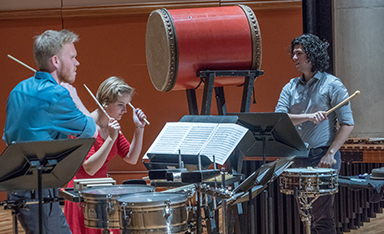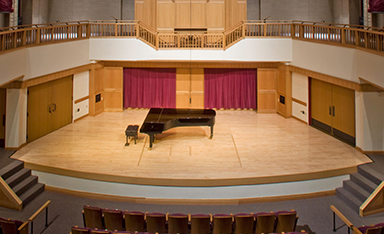The Minor in Ethnomusicology invites students to explore music not only as sound but as a vital expression of culture, identity, the human experience. Through the study of musical traditions from around the world — including popular, traditional, and classical genres — students examine how music functions within diverse societies and across global histories.
This 24-credit program can be completed in as little as two years and combines coursework in ethnomusicology, musicology, and anthropology. In addition to academic study, you’ll actively engage with global performance traditions through participation in Lamont’s world music ensembles, gaining firsthand insight into music as a lived and communal practice.
Whether you’re a musician, a scholar, or simply curious about the cultural dimensions of sound, this minor provides valuable tools for understanding the role of music in shaping social life and complements a wide range of majors — from music and international studies to anthropology, sociology, and beyond —encouraging critical thinking, cultural awareness, and interdisciplinary research.
Minor Requirements
Students complete a total of 24 credits for the minor in ethnomusicology, including MUAC 1012 Music, Society, and Culture; MUAC 2057 Intro to World Musics; three elective courses; and five credits of ensembles. Interested students are encouraged to schedule an introductory advising meeting with the chair of Musicology and Ethnomusicology, Professor Sarah Morelli.
For more information see the Undergraduate Bulletin.
Admission Requirements
This program does not require experience on a musical instrument, and there is no audition needed for admission. Interested students should contact Professor Sarah Morelli, chair of Musicology and Ethnomusicology.
Featured Courses
MUAC 1012
Music, Society & Culture
About this Course
This course introduces students to the music of a variety of world areas. For each unit, students examine a diverse array of genres, analyzing music's relationship to religious life, aesthetics, politics, social organization, and identity. We also discuss the impact of globalization, transnationalism and immigration on the shaping and transformation of musical practice and meaning in each region. Reading materials, listening assignments, and discussion topics are supplemented by in-class performance workshops, designed to give students firsthand experience in non-Western performance traditions. This course counts toward the Analytical Inquiry: Society and Culture requirement.
MUAC 2057
Intro to World Musics
About this Course
This course is designed as an introduction to select world music traditions and to ethnomusicology, a discipline many define as the study of music in culture. We focus on three world areas: North India, Brazil, and Senegal. For each of these units, we examine various genres and musical systems and explore music's connection to ritual, belief, aesthetic ideals, politics, and social organization, asking what makes music meaningful for practitioners and audiences. Lectures and discussions are supplemented by regular guest lecture-demonstrations, films and hands-on workshops. Because students interpret the musical works as they represent the ideas and artifacts of human culture and analyze the connections between these and varied human experiences and perceptions of the world, this course may be used to partially fulfill the general education requirement Analytical Inquiry: Society and Culture. Prerequisite for music majors: MUAC 2051.
MUEN 3041
North Indian Classical Ensemble
About this Course
The arts of India are distinguished by their close interrelationship; rhythm, melody and movement are all encompassed by the term "sangeet." In keeping, DU's North Indian Classical Ensemble is dedicated to the practice of all three of these arts, through singing, rhythmic recitation and dance. Participation in this ensemble involves studying the ornate and highly refined systems of Hindustani music and Kathak dance. No prior experience is necessary; all that is required is a positive attitude and a desire to learn!




